New Zealand ended a three-match losing streak with a 35-23 Rugby Championship second-round win over South Africa at Ellis Park in Johannesburg on Saturday.
A last-minute try by lock Scott Barrett sealed victory for the All Blacks after a thriller, and may have saved the job of embattled coach Ian Foster.
Foster has been under fire after five losses in six matches ahead of the Johannesburg showdown, including a 16-point loss to Rugby World Cup champions the Springboks last weekend.
But a much-improved All Blacks side turned the tables after a thriller in which South Africa led by one point with six minutes remaining before conceding two converted tries.
New Zealand recovered from a poor start, with full-back Jordie Barrett knocking on within 40 seconds, to control the early stages.
South Africa suffered an early blow with only 10 minutes gone when groggy winger Jesse Kriel was forced to retire and veteran full-back Willie le Roux came on.
Fortunately for full-back Damian Willemse, there was no score as he sat on the touchline due to a yellow card while a sell-out 61,519 crowd roared on the home side.
The first points in an arm wrestle came on 25 minutes when recalled fly-half Richie Mo’unga slotted a penalty for the visitors.
His successful kick triggered a period of away dominance in which captain and flanker Sam Cane and hooker Samson Taukei’aho scored tries, the second of which Mo’unga converted.
– South African concerns –
When New Zealand moved the ball wide, winger Will Jordan sent Cane over in the corner for his second try against South Africa.
Taukei’aho then used his strength to power over from close range and this time Mo’unga split the posts with his kick for a 15-point lead five minutes before half-time.
An indication of South Africa’s concerns was a series of the first-half substitutions with hooker Malcolm Marx, prop Steven Kitshoff and No. 8 Jasper Wiese introduced.
The hosts needed to score quickly, and they did with center Lukhanyo Am diving over and fly-half Handre Pollard converting.
Pollard had not missed a kick at goal in his last two Tests — against Wales in Cape Town and New Zealand in Mbombela — and he maintained his record in first-half added time.
Opting to kick for goal from the halfway line, his kick just made it and as the teams trooped off the field a 15-point New Zealand advantage had been cut to 15-10.
The second half became a thriller with South Africa finally edging in front at 23-21 when Pollard kicked a penalty on 68 minutes.
But intense All Blacks pressure led to tries from center David Havili and lock Scott Barrett and Mo’unga converted both to get the visitors back on the winning trail.
Wing Makazole Mapimpi was the other Springbok try scorer as Pollard accumulated 13 points from two conversions and three penalties.dl/iwd
.



